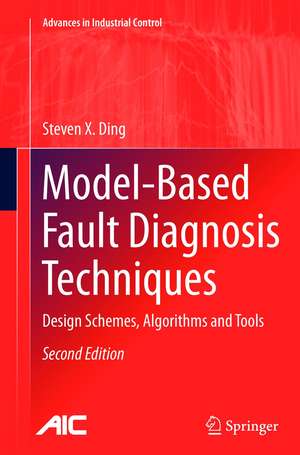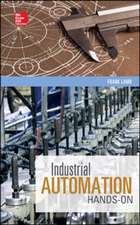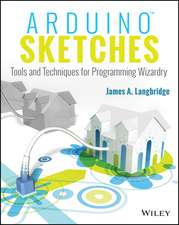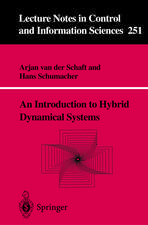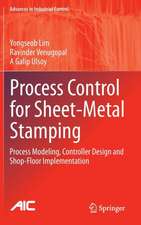Model-Based Fault Diagnosis Techniques: Design Schemes, Algorithms and Tools: Advances in Industrial Control
Autor Steven X. Dingen Limba Engleză Paperback – 28 ian 2015
This second edition of Model-Based Fault Diagnosis Techniques contains:
• new material on fault isolation and identification and alarm management;
• extended and revised treatment of systematic threshold determination for systems with both deterministic unknown inputs and stochastic noises;
• addition of the continuously-stirred tank heater as a representative process-industrial benchmark; and
• enhanced discussion of residual evaluation which now deals with stochastic processes.
Model-based Fault Diagnosis Techniques will interest academic researchers working in fault identification and diagnosis and as a text it is suitable for graduate students in a formal university-based course or as a self-study aid for practising engineers working with automatic control or mechatronic systems from backgrounds as diverse as chemical process and power engineering.
| Toate formatele și edițiile | Preț | Express |
|---|---|---|
| Paperback (1) | 955.25 lei 6-8 săpt. | |
| SPRINGER LONDON – 28 ian 2015 | 955.25 lei 6-8 săpt. | |
| Hardback (1) | 1233.06 lei 6-8 săpt. | |
| SPRINGER LONDON – 2 ian 2013 | 1233.06 lei 6-8 săpt. |
Din seria Advances in Industrial Control
- 15%
 Preț: 643.34 lei
Preț: 643.34 lei - 23%
 Preț: 582.63 lei
Preț: 582.63 lei - 18%
 Preț: 783.98 lei
Preț: 783.98 lei - 18%
 Preț: 947.35 lei
Preț: 947.35 lei - 20%
 Preț: 568.24 lei
Preț: 568.24 lei - 15%
 Preț: 643.16 lei
Preț: 643.16 lei - 18%
 Preț: 899.21 lei
Preț: 899.21 lei - 18%
 Preț: 891.33 lei
Preț: 891.33 lei - 18%
 Preț: 740.57 lei
Preț: 740.57 lei - 18%
 Preț: 961.23 lei
Preț: 961.23 lei - 18%
 Preț: 955.08 lei
Preț: 955.08 lei - 15%
 Preț: 645.28 lei
Preț: 645.28 lei - 15%
 Preț: 638.43 lei
Preț: 638.43 lei - 18%
 Preț: 901.11 lei
Preț: 901.11 lei - 18%
 Preț: 1410.94 lei
Preț: 1410.94 lei - 18%
 Preț: 728.91 lei
Preț: 728.91 lei - 20%
 Preț: 1003.78 lei
Preț: 1003.78 lei - 18%
 Preț: 947.35 lei
Preț: 947.35 lei - 15%
 Preț: 643.34 lei
Preț: 643.34 lei - 15%
 Preț: 654.30 lei
Preț: 654.30 lei - 18%
 Preț: 950.52 lei
Preț: 950.52 lei - 15%
 Preț: 644.30 lei
Preț: 644.30 lei - 18%
 Preț: 1393.09 lei
Preț: 1393.09 lei - 18%
 Preț: 950.21 lei
Preț: 950.21 lei - 18%
 Preț: 949.90 lei
Preț: 949.90 lei - 18%
 Preț: 949.42 lei
Preț: 949.42 lei - 18%
 Preț: 950.52 lei
Preț: 950.52 lei - 18%
 Preț: 1113.71 lei
Preț: 1113.71 lei - 15%
 Preț: 650.04 lei
Preț: 650.04 lei - 15%
 Preț: 644.95 lei
Preț: 644.95 lei - 18%
 Preț: 950.33 lei
Preț: 950.33 lei - 18%
 Preț: 948.61 lei
Preț: 948.61 lei - 18%
 Preț: 1112.60 lei
Preț: 1112.60 lei - 15%
 Preț: 644.63 lei
Preț: 644.63 lei - 18%
 Preț: 953.20 lei
Preț: 953.20 lei - 18%
 Preț: 945.62 lei
Preț: 945.62 lei - 15%
 Preț: 640.88 lei
Preț: 640.88 lei - 15%
 Preț: 640.88 lei
Preț: 640.88 lei - 20%
 Preț: 650.92 lei
Preț: 650.92 lei - 18%
 Preț: 1112.60 lei
Preț: 1112.60 lei - 20%
 Preț: 998.36 lei
Preț: 998.36 lei - 15%
 Preț: 643.34 lei
Preț: 643.34 lei - 18%
 Preț: 948.92 lei
Preț: 948.92 lei - 18%
 Preț: 1381.43 lei
Preț: 1381.43 lei - 15%
 Preț: 651.51 lei
Preț: 651.51 lei - 15%
 Preț: 647.08 lei
Preț: 647.08 lei - 20%
 Preț: 563.66 lei
Preț: 563.66 lei - 18%
 Preț: 992.64 lei
Preț: 992.64 lei - 18%
 Preț: 1225.79 lei
Preț: 1225.79 lei
Preț: 955.25 lei
Preț vechi: 1164.93 lei
-18% Nou
Puncte Express: 1433
Preț estimativ în valută:
182.81€ • 190.15$ • 150.92£
182.81€ • 190.15$ • 150.92£
Carte tipărită la comandă
Livrare economică 14-28 aprilie
Preluare comenzi: 021 569.72.76
Specificații
ISBN-13: 9781447161110
ISBN-10: 1447161114
Pagini: 524
Ilustrații: XX, 504 p.
Dimensiuni: 155 x 235 x 28 mm
Greutate: 0.73 kg
Ediția:2nd ed. 2013
Editura: SPRINGER LONDON
Colecția Springer
Seria Advances in Industrial Control
Locul publicării:London, United Kingdom
ISBN-10: 1447161114
Pagini: 524
Ilustrații: XX, 504 p.
Dimensiuni: 155 x 235 x 28 mm
Greutate: 0.73 kg
Ediția:2nd ed. 2013
Editura: SPRINGER LONDON
Colecția Springer
Seria Advances in Industrial Control
Locul publicării:London, United Kingdom
Public țintă
ResearchCuprins
Basic Ideas, Major Issues, and Tools in the Observer-Based FDI Framework.- Modelling of Technical Systems.- Structural Fault Detectability, Isolability and Identifiability.- Basic Residual Generation Methods.- Perfect Unknown Input Decoupling.- Residual Generation with Enhanced Robustness against Unknown Inputs.- Residual Generation with Enhanced Robustness against Model Uncertainties.- Norm-Based Residual Evaluation and Threshold Computation.- Statistical-Methods-Based Residual Evaluation and Threshold Setting.- Integration of Norm-Based and Statistical Methods.- Integrated Design of Fault Detection Systems.- Fault Isolation Schemes.
Notă biografică
Steven X. Ding began investigating issues concerned with model-based fault detection and identification in 1986 during his PhD. Following a three-year stay in industry, in which he gained experience with the application of FDI techniques in real technical processes, he returned to academia and during the last 17 years has become a university professor and institute head. He has been involved with numerous national and international research grants and industrial projects in the development of advanced FDI methods and their application in different sectors of industry. He teaches fault diagnosis and fault-tolerant systems to Masters students and advanced FDI methods to PhD students at the University of Duisburg-Essen. He has also guest-lectured and taught courses on these subjects at other universities and research institutes. Professor Ding has published more than 80 journal and 130 conference papers associated with the field of FDI.
Textul de pe ultima copertă
Guaranteeing a high system performance over a wide operating range is an important issue surrounding the design of automatic control systems with successively increasing complexity. As a key technology in the search for a solution, advanced fault detection and identification (FDI) is receiving considerable attention. This book introduces basic model-based FDI schemes, advanced analysis and design algorithms, and mathematical and control-theoretic tools.
This second edition of Model-Based Fault Diagnosis Techniques contains:
· new material on fault isolation and identification, and fault detection in feedback control loops;
· extended and revised treatment of systematic threshold determination for systems with both deterministic unknown inputs and stochastic noises;
Model-based Fault Diagnosis Techniqueswill interest academic researchers working in fault detection and diagnosis and as a textbook it is suitable for graduate students in a formal university-based course or as a self-study aid for practicing engineers working with automatic control or mechatronic systems from backgrounds as diverse as chemical process and power engineering.
Advances in Industrial Control aims to report and encourage the transfer of technology in control engineering. The rapid development of control technology has an impact on all areas of the control discipline. The series offers an opportunity for researchers to present an extended exposition of new work in all aspects of industrial control.
This second edition of Model-Based Fault Diagnosis Techniques contains:
· new material on fault isolation and identification, and fault detection in feedback control loops;
· extended and revised treatment of systematic threshold determination for systems with both deterministic unknown inputs and stochastic noises;
- addition of the continuously-stirred tank heater as a representative process-industrial benchmark; and
· enhanced discussion of residual evaluation in stochastic processes.
Model-based Fault Diagnosis Techniques will interest academic researchers working in fault detection and diagnosis and as a textbook it is suitable for graduate students in a formal university-based course or as a self-study aid for practicing engineers working with automatic control or mechatronic systems from backgrounds as diverse as chemical process and power engineering.
Model-based Fault Diagnosis Techniques will interest academic researchers working in fault detection and diagnosis and as a textbook it is suitable for graduate students in a formal university-based course or as a self-study aid for practicing engineers working with automatic control or mechatronic systems from backgrounds as diverse as chemical process and power engineering.
Model-based Fault Diagnosis Techniqueswill interest academic researchers working in fault detection and diagnosis and as a textbook it is suitable for graduate students in a formal university-based course or as a self-study aid for practicing engineers working with automatic control or mechatronic systems from backgrounds as diverse as chemical process and power engineering.
Advances in Industrial Control aims to report and encourage the transfer of technology in control engineering. The rapid development of control technology has an impact on all areas of the control discipline. The series offers an opportunity for researchers to present an extended exposition of new work in all aspects of industrial control.
Caracteristici
Gives readers a framework of model-based FDI techniques, helping them to become familiar with the basic ideas and schemes in a systematic way Design algorithms and mathematical and control engineering tools encourage the translation of the ideas of the book to readers’ own systems Examples and benchmarks provide a means of practising the ideas and judging the methods described Classroom tested in the author’s teaching of graduate students Includes supplementary material: sn.pub/extras
